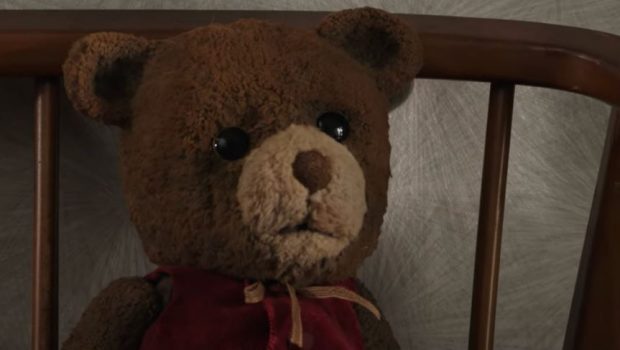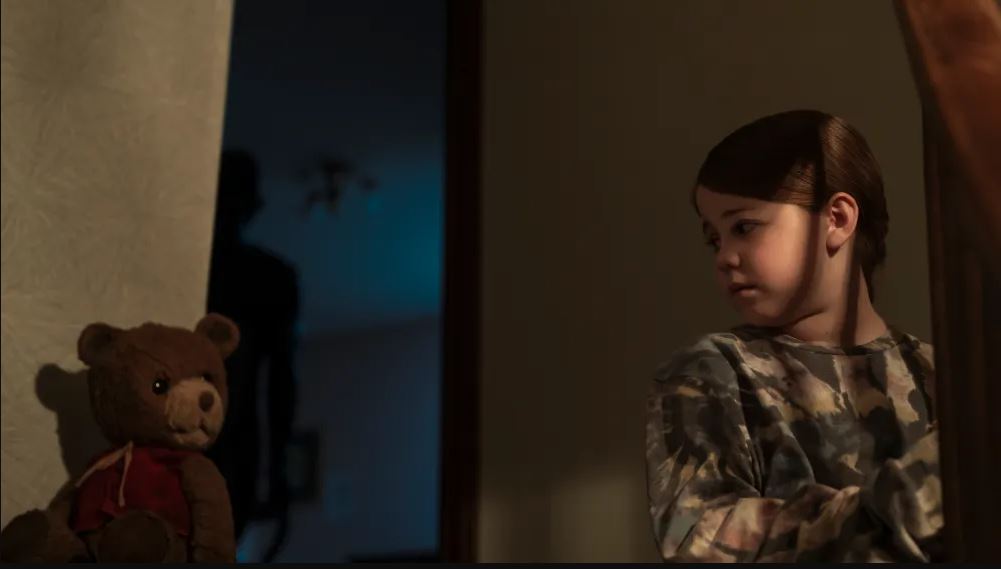Imaginary – Film Review
Reviewed by Harris Dang on 7th of March, 2024
StudioCanal presents a film by Jeff Wadlow
Produced by Jeff Wadlow and Jason Blum
Starring DeWanda Wise, Pyper Braun, Tom Payne, Betty Buckley, Taegen Burns, Matthew Sato, Veronica Falcon, Dane DiLiegro
Cinematography James McMillan
Edited by Sean Albertson
Music by Sparks & Shadows
Running Time: 104 minutes
Rating: M
Release Date: the 7th of March 2024
Imaginary tells the story of Jessica (DeWanda Wise), an acclaimed author who returns to her childhood home amidst recurring nightmares that may reflect her past and her burgeoning imagination. She moves back with her husband/singer, Max (Tom Payne), and their two step‑daughters, angsty Taylor (Taegan Burns) and the spritely Alice (Pyper Braun). Both girls are estranged to Jessica due to their mother who was taken to the mental institution.
While Jessica tries bonding with her step-daughters, Alice grows increasingly attached to her childhood teddy bear, Chauncey. The stronger the attachment, the more concerned Jessica is about Alice. Jessica realises it may have something to do with Chauncey, that nilly-willy silly old bear.
Imaginary is director Jeff Wadlow’s latest film. He is best known for genre pieces that specialise in the horror genre and a few diversions into action and comedy. While he may seem like a versatile filmmaker, it is unfortunate his films have not been warmly received. Within his snug home at the Blumhouse studio, he developed two other films, Truth or Dare (Date) and Fantasy Island (Date), which both inherited horrible reviews. Will Wadlow’s Imaginary prove three times lucky?
Imaginary may lack imagination in its storytelling, but at least it knows its lane. It remains unpretentious even when delving into themes of trauma, grief, and loss. The film aims to deliver scares, fun, and even a dash of whimsy. Its commercial ambitions ensure it is a watchable effort. It is also nowhere near as incoherent as Truth or Dare and Fantasy Island. Its narrative remains straightforward, and it spends very little time on unnecessary diversions or subplots.
The straightforward approach also applies to the acting, which fares from good to fine. Wise fares best as Jessica. She manages to be endearing and convincingly distraught as she juggles family strife, the demands of her work, and of course, saving her family from the horrors of the imagination. Braun manages to balance precociousness and emotional intelligence quite well while Burns is quite amusing with her cynicism despite her character being written as annoyingly contrived.
Speaking of contrivances, Imaginary’s horror elements are cobbled from superior horror films and fantasy flicks. For example, there are elements of The Pit (1981), such as the bear telling her what to do by “speaking” with a child’s voice. Meanwhile, the imaginary settings and monsters look remarkably similar to those in Beetlejuice (1988) and Monsters Inc. (2001). Inside Out (2015) is also mentioned many times and Insidious (2010) is echoed. The latter is derivative of Poltergeist (1982), as it ventures into eerie fantasy worlds. One cannot help but feel it would be better to watch these films instead.
Having a derivative storyline is not a deal-breaker. The conventional use of innocuous, wholesome imagery in horror is also amusing. For example, the bear’s progression from protector to instigator and eventually perpetrator is highly effective. However, Wadlow and his screenwriters, Greg Erb and Jason Oremland (who both specialise in family films, including The Princess and the Frog, 2009), lack ambition and resort to tired tropes and cliches. One is obvious enough it spells out the film’s title and another is so blatant the film references it through its mentions of the animated film Inside Out (and its characters) ad nauseum.
Worst of all is the use of the character of Jessica’s babysitter, played by Betty Buckley. Buckley is certainly no stranger to horror thanks to her recent appearances in M. Night Shyamalan films and the horror classic Carrie (1976). Her presence is always welcome. However, her character’s presence in the narrative is a huge signpost that it makes her screentime feel laboured (and unintentionally funny in how she pops up) and the payoff feel meaningless as to her motives.
While it may sound like faint praise, Imaginary is the best film Wadlow has made within in the Blumhouse studio. It displays a keener sense of filmmaking confidence, a more assured handling of tone that switches between horror and comedy, and sharper editing that negates the prevalent throwaway feel that plagued Wadlow’s early work. Regretfully after all the positives, Imaginary succumbs to blatantly derivative, woefully predictable storytelling, and, with a sense of irony, a lack of imagination.
Summary: This is the best film Wadlow has made within in the Blumhouse studio. However, it still succumbs to predictable storytelling, and, with a sense of irony, a lack of imagination.








